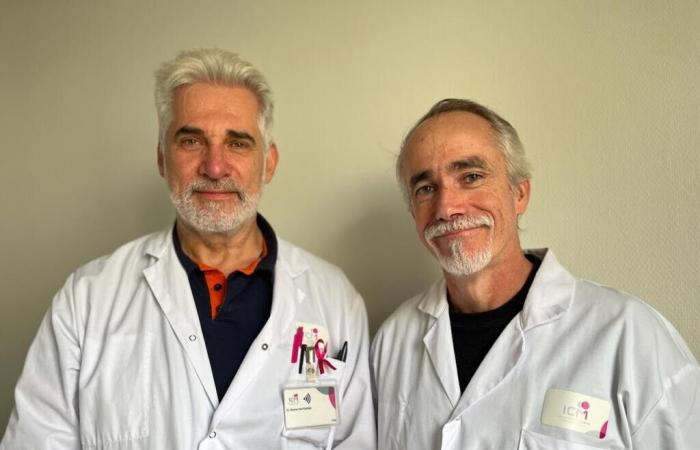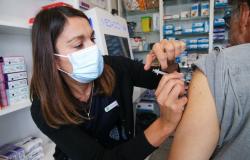Par
Leah Pippinato
Published on
Oct 13, 2024 at 7:39 p.m.
See my news
Follow Metropolitan
Each year, Pink October highlights the importance of breast cancer screening, a preventive measure that saves lives. However, in Hérault, women’s participation in screening remains lower than expected, particularly in rural areas where access to care is limited. While Montpellier, a pioneering city in terms of health, displays encouraging results, territorial disparities slow down the overall impact of screening throughout the department. Between awareness, local initiatives and logistical challenges, the fight against breast cancer continues.
We spoke with Professor William Jacot, oncologist at the Montpellier Cancer Institute, and Dr Marian Gutowski, surgical oncologist at the ICM and specialist in breast cancer, radiologist specializing in mammography, to better understand the situation and the solutions envisaged.
What is the current situation of breast cancer screening in Hérault and Montpellier?
Dr. Gutowski: The situation in Montpellier is rather satisfactory. Thanks to the high density of medical infrastructure, prevention and awareness campaigns, the screening rate is relatively high. However, if we take into account the entire department of Hérault, the picture is less optimistic. In 2019, the screening rate in Hérault was 47%, below the national average and far from the objectives set by the health authorities. The Covid-19 pandemic has further worsened the situation, causing a drop to 42% in 2020. These are alarming figures which show that almost 6 in 10 women do not participate in screening. What is all the more worrying is that these figures are particularly low in rural areas and small, isolated communities.
How do you explain this difference between Montpellier and the more rural areas of Hérault?
Dr. Gutowski: In Montpellier, women are fortunate to have easier access to care. With numerous radiology centers, clinics, hospitals, and local information campaigns, they are better aware and encouraged to get screened. Furthermore, Montpellier is a city where there are many events organized as part of Pink October, which reinforces the impact of awareness. The problem lies in the more rural areas of Hérault. In places like the upper cantons or towns far from Béziers, medical infrastructure is much rarer. Women who live in these areas sometimes have to travel long distances to access a mammogram. This lack of accessibility is a major obstacle, and the social factor should not be underestimated either: in these rural areas, there is often a lack of information and awareness, which means that some women do not see not the importance of doing this examination regularly, especially in the absence of visible symptoms.
In addition to these access difficulties, you spoke of psychological reluctance. Can you tell us more about this?
Pr Jacot: Screening, by its nature, involves looking for a problem even before symptoms appear. However, this can cause significant anxiety. Many women prefer not to undergo this examination for fear of the result. They often say to themselves, “If I don’t feel anything, why should I worry?” “. This type of reasoning is very common, especially in areas where awareness of screening is lower. Added to this is sometimes the fear of treatments: if cancer is detected, some women fear heavy treatments such as chemotherapy or surgery. There is also a practical aspect, with the idea that mammography is an unpleasant, even painful examination for some patients.
Why is it important to get tested despite this fear?
Pr Jacot: Screening is crucial for the simple reason that the earlier breast cancer is detected, the higher the chances of cure. Statistically, breast cancers detected at an early stage have a cure rate greater than 90%, and in these cases, treatments are much less burdensome. A tumor that is diagnosed early can often be treated with a small surgery and radiation therapy, avoiding more invasive treatments like chemotherapy or mastectomy. Conversely, if a tumor is discovered at a more advanced stage, it is more likely to have invaded the lymph nodes or spread to other parts of the body, which greatly complicates treatment and reduces the chances of healing. In short, being screened not only increases the chances of survival, but also limits the impact of treatments on quality of life.
Dr. Gutowski : In addition, mammography can detect abnormalities that are not palpable, that is, tumors that are so small that they do not cause any symptoms. Without screening, these cancers would go undetected for months or even years until they become more serious.
How can we improve access to screening for women living in these isolated rural areas of Hérault?
Pr Jacot: One of the solutions that we have adopted in Hérault is mammobiles. These are mobile screening units, trucks specially equipped to carry out mammograms which travel to rural areas of the department. The idea is simple: bring screening directly to where women live, in remote villages or small communities, rather than forcing them to travel long distances to get to a radiology center. This makes it possible to reach populations who would not have had the means or the opportunity to be screened otherwise.
Once an abnormality is detected during a mammogram, what is the care pathway for these patients?
Dr. Gutowski: When an abnormality is detected during a mammogram, the patient is invited to carry out additional examinations. The abnormality detected is not necessarily cancerous, which is why ultrasounds or other additional images may be required to better characterize this abnormality. If a suspicious tumor is identified, a biopsy will be performed. The latter allows cells to be analyzed under a microscope to determine whether they are cancerous or not. If the diagnosis of cancer is confirmed, a treatment pathway is quickly put in place. In general, this involves a multidisciplinary consultation meeting (RCP) where several specialists, including oncologists, surgeons and radiologists, establish an appropriate treatment plan.
Pr Jacot: This treatment plan will depend on the size of the tumor, its type, and the stage at which it was detected. The earlier the cancer is detected, the milder the treatment options. In the early stages, it is possible to remove the tumor by conservative surgery, preserving the breast, and supplement with radiotherapy. In more advanced stages, surgery may be more invasive, and chemotherapy or hormone therapy may be used.
Does the Pink October campaign really have an effect on screening in Hérault?
Dr. Gutowski: Pink October above all helps to take the drama out of screening. This helps women understand that getting tested does not automatically mean receiving a negative diagnosis. On the contrary, in 99% of cases, mammograms reveal nothing serious, and women leave reassured. Even if they learn that they have a tumor, they understand that detecting it early greatly improves their chances of recovery. Pink October is therefore essential to continue to remind all women, and particularly in Hérault, that screening is a matter of prevention and health protection.
More than 60,000 women were diagnosed with breast cancer last year in France, according to the latest report from the Inca (National Cancer Institute). However, the number of deaths is decreasing thanks to advances in screening. “The earlier it is, the less burdensome the treatments,” concludes Professor Jacot. So why wait?
Follow all the news from your favorite cities and media by subscribing to Mon Actu.






